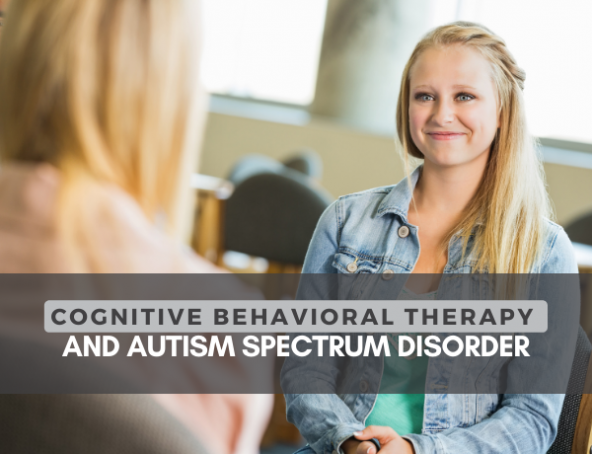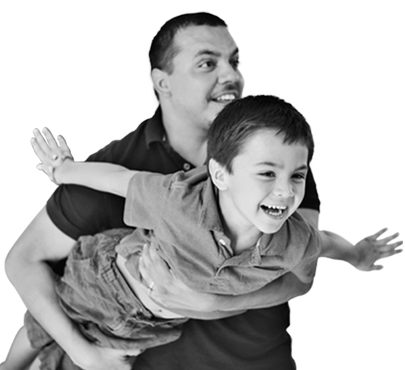Cognitive Behavioral Therapy and Autism Spectrum Disorder

Can CBT Help Individuals with Autism?
As children with autism grow into adolescence and adulthood, they must learn to navigate a complex social world that is full of mixed signals. Maintaining self-confidence is critical when things get uncertain, and that can be a very vulnerable area for people on the spectrum. One way to overcome these challenges is to strengthen resiliency, which is a key focus of Cognitive Behavioral Therapy for individuals with autism spectrum disorder (ASD).
Resilience—the ability to adapt to difficult situations, and to harness your inner strength to rebound from a setback or a challenge—is fundamental to living a fulfilling life. A lack of resilience can cause a person to dwell on problems, feel victimized, become overwhelmed, or turn to unhealthy coping mechanisms.
Resilience can help protect you from various mental health conditions, such as depression and anxiety. It can also help offset factors that increase the risk of previous traumas, such as being bullied or not accepted by a peer group. For individuals with an existing mental health condition, being resilient can improve their coping ability.
On the flip side, a negative pattern of thinking can interfere with resilience. People may resort to patterns of negative thoughts and self-doubt because of past experiences, mental health challenges, or even genetics. For example, when people immediately draw damaging conclusions based on past experiences and apply them to similar situations, it may leave them with negative feelings about themselves. For individuals with autism, breaking this cycle is so important to set the course for a happy and healthy lifestyle.
Cognitive Behavioral Therapy (CBT) is an evidence-based treatment model that focuses on building resiliency to improve a person’s thought process and how they respond to their personal experiences. CBT is offered through AZA United’s Resilient Hearts Counseling Program, which offers professional counseling for individuals, couples and families affected by autism.
What is Cognitive Behavioral Therapy?
CBT is the current gold standard of psychotherapy (which is sometimes referred to as “talk therapy”) and can be an effective technique to help anyone who gets stuck in unhelpful patterns of thinking. At Arizona Autism United, CBT is provided by a Licensed Professional Counselor (LPC) or Licensed Associate Counselor (LAC).
The method of CBT is to teach people how to identify and replace their unhelpful thoughts with more helpful and accurate thoughts. When that happens, it begins to change how people feel and respond to stressful circumstances. CBT therapists can help people see how their core beliefs influence their relationships and how they interpret things that happen in their lives. By exploring these core beliefs, we can make long lasting changes to our thought process, which impacts how we feel and helps us respond to difficult situations in a way that aligns with our values.
For example, imagine that you cheerfully greet someone you know, but they don’t respond to you. Based on your past experiences or thought pattern habits, you may automatically assume that it means they no longer like you because they didn’t acknowledge you. Those thoughts leave you feeling sad, which then causes you to avoid that person in the future. However, it may just be that the person didn’t notice you, was distracted, is shy, or any other explanation that isn’t what you thought. In other words, your perception may have been false. But if you lack resilience and self-confidence, you may quickly give up and assume the worst, which has a negative impact on your quality of life and future opportunities.
CBT provides tools that help individuals break free from these harmful patterns of thinking. In the same scenario, you can understand that there may be another reason the person didn’t respond—they had a lot on their mind, or they weren’t feeling well—things that have nothing to do with you or how the person feels about you. Rather than avoiding the person, you can choose an alternative response, such as making an effort to contact the person to make sure they’re okay.
Negative thought patterns can sometimes develop into self-fulfilling prophecies, where your greatest fears come true because of the actions you take in response to those fears. That can make life very difficult for someone who lacks resilience. CBT helps people learn how to replace those thought patterns with more realistic and less harmful thoughts, to think more clearly and exercise more control over their thought patterns.
CBT and Autism Spectrum Disorder
There are a wide variety of therapies and treatments that help individuals with autism overcome challenging behaviors and develop essential social skills. Two such examples include Applied Behavior Analysis and Speech & Language Therapy. However, these treatments may fall short in helping adolescents, teens and adults on the spectrum who have sufficient language and social skills but struggle with self-confidence and resiliency. That is where specialized counseling can step in to fill the void. A recent study found that Cognitive Behavioral Therapy may significantly improve the symptoms of ASD and social-emotional problems in children or adolescents.
CBT is thought to be especially beneficial for older children, teens and adults with autism, particularly those with other mental health conditions, such as anxiety, depression, or attention deficit hyperactivity disorder (ADHD).
While studies have demonstrated that CBT can be an effective intervention, it is not a magic wand that eliminates behaviors or other issues associated with ASD. Instead, it focuses on secondary issues related to life experience on the autism spectrum: depression, anxiety, stress, anger, aggression, trauma, bullying, social skills deficits, or limited social support.
Talk therapy is not an effective treatment for all individuals with autism, but it can certainly be helpful for those with the necessary verbal and communication skills. In another study which found that children with ASD can have the cognitive skills required for CBT, participants with ASD were able to distinguish thoughts, feelings, and behaviors to work on altering their thoughts. For children with autism that struggle to identify their feelings, therapists can increase their use of repetition, visual supports, or other therapeutic techniques.
One component of CBT focuses on social situations, which may be intuitive to others but difficult for a person with autism. CBT can help individuals learn to read social interactions more accurately, including the reactions and behaviors of other people, to monitor and adjust their own behavior and responses more fluidly.
CBT can also help people work toward self-acceptance to mitigate the impact of things that cannot be changed, such as any cognitive deficits they may have. It can help teach people with autism to recognize and adjust to unhelpful patterns of information processing that contribute to stress, anxiety and depression. Helping people with ASD shift to more accurate and more helpful cognitions can be a powerful tool in helping them realize their goals and potential.
Families that struggle with autism-related issues, including a child's obsessive interests, angry outbursts, repetitive rituals, and unusual behaviors, may also benefit from individual or family counseling using a CBT-based approach. Helping parents and family members identify ways in which their own patterns of thinking, feeling or behaving may be more or less helpful can shift the entire family’s dynamic in a positive direction.
Resilience helps people and communities thrive. Cognitive Behavioral Therapy is an important component to a holistic approach of supporting the diverse needs of the autism community. As a community organization, Arizona Autism United is committed to building and supporting a strong community with healthy and resilient families.
Contact our Family Support Team if you would like to learn how to get started with Clinical Family Coaching or any other programs and services that we offer. Our Family Support Team is always available to help and is available at no charge to all members of the autism and developmental disability community. Schedule a free phone appointment that works with your schedule by visiting azaunited.org/supportcall
You may also be interested in:
For more helpful resources and information, follow AZA United on social media:


.png)




